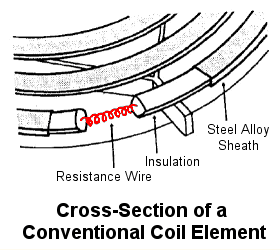We have electric burner eyes like shown above in a 20+ years-old White-Westinghouse range. My wife is an excellent cook and she's used this range earnestly for 8 years. Recently after she had cooked dinner we heard a crackling noise coming from the range area. The range was completely off and had been for at least 10 minutes. I narrowed the noise down to one burner. I pulled the burner element out of the range and it continued to make a crackling sound. It sounded like it was on fire inside of the heating element. It continued making a steady crackling sound for at least 30 minutes. There was no smoke or warmth emerging from it. It didn't smell noticeably either. Is it possible for these elements to catch on fire? Is there a better explanation for the sound we heard?
-
1Perhaps from the element cooling down, like the sounds a car makes when turned off after a long drive?– IronEagleCommented Oct 9, 2019 at 18:23
-
@IronEagle . That's an interesting idea, but I'm doubtful. The crackling was more rapid than what I've hard from a car cooling down. It also wasn't warm to the touch when I pulled it out of the range top so it was pretty close to room temperature.– chicksCommented Oct 9, 2019 at 18:36
-
does the element still work, by chance?– IronEagleCommented Oct 9, 2019 at 18:40
-
We haven't plugged it back in since. I think I'd be more likely to replace the element rather than plugging it back in. I don't want to risk it causing a "real" fire.– chicksCommented Oct 9, 2019 at 18:44
-
1The material is a insulator you can get them glowing red hot and they will not burn in the core is the conductive part of the insulator and the outer shield. If they crack they can put on a nice arc show but they quickly short to the outer case and trip the breaker. If there is no heat it could not be on fire. I would go with noise from contracting same as iron eagle mentioned. Circular element touching a dissimilar metal at different points. This makes more sense to me than a room temp element burning.+– Ed BealCommented Oct 9, 2019 at 18:49
2 Answers
Nothing in the heating element burns. It has an Inconel sheath and a Nichrome resistance element - essentially the same alloy. The white insulation powder is magnesium oxide. If the internal wire comes in contact with the sheath , it may melt a hole before a fuse or breaker shuts off. I expect the crackling noise is contraction of cooling components. The alloy names are copyrights of Inco ( now gone) and other names may be used for the same alloys.
Electric heating elements have a small coiled resistive wire element inside, coated with a ceramic material, then that is covered with the metallic (steel alloy) surface material that you see.

If the resistance wire inside breaks, it can arc across inside, but you never see it because of the surrounding ceramic and steel sheath. But you can hear it arcing; that ticking sound.
You need to replace that element asap. Even if it still works, its only because the arcing is still allowing some current to flow, albeit a lot less so it will not get as hot. Eventually it will completely fail and if the ceramic fails, it can be dangerous.
-
2The OP said it continued to make the sound when they unhooked the element... Does he have that new magical electricity that makes the element arc when unhooked?– GunnerCommented Oct 9, 2019 at 20:16
-

